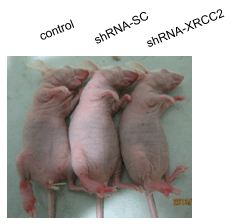shRNA-Mediated XRCC2 Gene Knockdown Efficiently Sensitizes Colon Tumor Cells to X-ray Irradiation in Vitro and in Vivo
Abstract
Share and Cite
Wang, Q.; Wang, Y.; Du, L.; Xu, C.; Sun, Y.; Yang, B.; Sun, Z.; Fu, Y.; Cai, L.; Fan, S.; et al. shRNA-Mediated XRCC2 Gene Knockdown Efficiently Sensitizes Colon Tumor Cells to X-ray Irradiation in Vitro and in Vivo . Int. J. Mol. Sci. 2014, 15, 2157-2171. https://doi.org/10.3390/ijms15022157
Wang Q, Wang Y, Du L, Xu C, Sun Y, Yang B, Sun Z, Fu Y, Cai L, Fan S, et al. shRNA-Mediated XRCC2 Gene Knockdown Efficiently Sensitizes Colon Tumor Cells to X-ray Irradiation in Vitro and in Vivo . International Journal of Molecular Sciences. 2014; 15(2):2157-2171. https://doi.org/10.3390/ijms15022157
Chicago/Turabian StyleWang, Qin, Yan Wang, Liqing Du, Chang Xu, Yuanming Sun, Bing Yang, Zhijuan Sun, Yue Fu, Lu Cai, Saijun Fan, and et al. 2014. "shRNA-Mediated XRCC2 Gene Knockdown Efficiently Sensitizes Colon Tumor Cells to X-ray Irradiation in Vitro and in Vivo " International Journal of Molecular Sciences 15, no. 2: 2157-2171. https://doi.org/10.3390/ijms15022157
APA StyleWang, Q., Wang, Y., Du, L., Xu, C., Sun, Y., Yang, B., Sun, Z., Fu, Y., Cai, L., Fan, S., Fan, F., & Liu, Q. (2014). shRNA-Mediated XRCC2 Gene Knockdown Efficiently Sensitizes Colon Tumor Cells to X-ray Irradiation in Vitro and in Vivo . International Journal of Molecular Sciences, 15(2), 2157-2171. https://doi.org/10.3390/ijms15022157






